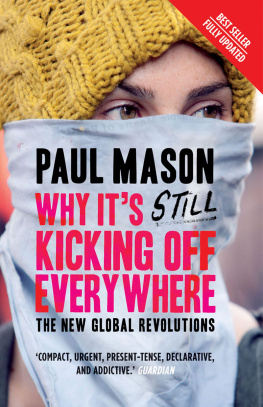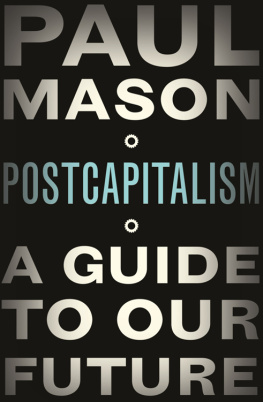Mason Paul - Syriza inside the labyrinth
Here you can read online Mason Paul - Syriza inside the labyrinth full text of the book (entire story) in english for free. Download pdf and epub, get meaning, cover and reviews about this ebook. City: Greece;London;England, year: 2015, publisher: Pluto Press, genre: Politics. Description of the work, (preface) as well as reviews are available. Best literature library LitArk.com created for fans of good reading and offers a wide selection of genres:
Romance novel
Science fiction
Adventure
Detective
Science
History
Home and family
Prose
Art
Politics
Computer
Non-fiction
Religion
Business
Children
Humor
Choose a favorite category and find really read worthwhile books. Enjoy immersion in the world of imagination, feel the emotions of the characters or learn something new for yourself, make an fascinating discovery.
- Book:Syriza inside the labyrinth
- Author:
- Publisher:Pluto Press
- Genre:
- Year:2015
- City:Greece;London;England
- Rating:4 / 5
- Favourites:Add to favourites
- Your mark:
- 80
- 1
- 2
- 3
- 4
- 5
Syriza inside the labyrinth: summary, description and annotation
We offer to read an annotation, description, summary or preface (depends on what the author of the book "Syriza inside the labyrinth" wrote himself). If you haven't found the necessary information about the book — write in the comments, we will try to find it.
Syriza inside the labyrinth — read online for free the complete book (whole text) full work
Below is the text of the book, divided by pages. System saving the place of the last page read, allows you to conveniently read the book "Syriza inside the labyrinth" online for free, without having to search again every time where you left off. Put a bookmark, and you can go to the page where you finished reading at any time.
Font size:
Interval:
Bookmark:

Syriza
Join the Left Book Club
Membership of the Left Book Club costs just 40
a year, for which you will receive four specially
commissioned or licensed titles each year, plus
other members benefits, such as access to events,
newsletters, and special offers on non-LBC titles.
To join please visit www.leftbookclub.com

Syriza
Inside the Labyrinth
Kevin Ovenden
Foreword by Paul Mason
First published 2015 by Pluto Press
345 Archway Road, London N6 5AA
www.plutobooks.com
Copyright Kevin Ovenden 2015
The right of Kevin Ovenden to be identified as the author of this work has been asserted by him in accordance with the Copyright, Designs and Patents Act 1988.
British Library Cataloguing in Publication Data
A catalogue record for this book is available from the British Library
ISBN 978 0 7453 3686 2 Paperback
ISBN 978 1 7837 1696 8 PDF eBook
ISBN 978 1 7837 1698 2 Kindle eBook
ISBN 978 1 7837 1697 5 EPUB eBook
This book is printed on paper suitable for recycling and made from fully managed and sustained forest sources. Logging, pulping and manufacturing processes are expected to conform to the environmental standards of the country of origin.
Typeset by Stanford DTP Services, Northampton, England
Text design by Melanie Patrick
Simultaneously printed in the European Union and United States of America
Dedicated to the memories of
Pavlos Fyssas (19792013)
and
Shahzad Luqman (19862013)
zindabad, they live
Contents
Series Preface
The first Left Book Club (193648) had 57,000 members at its peak, distributed 2 million books, and had formed 1,200 workplace and local groups engaging in cultural and political activity, including solidarity work (e.g. with Spain), political agitation (against appeasement) and much else. The LBC became an educational mass movement, remodelling British public opinion, and was thought to have been a major factor in the Labour landslide of 1945 and the construction of the welfare state. Publisher Victor Gollancz, the driving force, saw the LBC as a movement against poverty, fascism, and the growing threat of war. He aimed to resist the tide of austerity and appeasement, and to present radical ideas for progressive social change in the interests of working people. The Club was about enlightenment, empowerment and collective organisation.
The world today faces a crisis on the scale of the 1930s. Capitalism is trapped in a long-term crisis due to the dominance of finance over production and austerity programmes, causing suffering, shrinking demand and widening social inequalities, which are tearing apart the social fabric. International relations are increasingly tense and militarised notably in the Middle East and Eastern Europe with the danger of war. Neo-fascist and racist groups are gaining ground across much of Europe. Global warming threatens the planet and the whole of humanity with climate catastrophe. Workplace organisation has been weakened, and social democratic parties have been hollowed out by acceptance of pro-market dogma. Society has become more atomised, with politics suffering through peoples widespread alienation from the system. Yet the last decade has seen historically unprecedented levels of participation in street protest, implying a mass audience for progressive policies. But socialist ideas are no longer, as they were in the immediate post-war period, in the tea. One of neoliberalisms achievements has been to undermine ideas of solidarity, collective provision and public service.
Relaunching the Left Book Club will help us rise to the challenge posed by the global crisis. We will provide a series of high-quality books at affordable prices, published by Pluto Press. Our list will represent a full range of progressive traditions, perspectives and ideas. It will also include reprints of classic texts where appropriate. We hope the books will be used as the basis of reading circles, discussion groups, and other educational and cultural activities relevant to developing, sharing and disseminating ideas for progressive social change in the interests of working people.
The Left Book Club collective
Foreword
Paul Mason
One of our friends in the caf, crying. The primary school kids she works with have started to draw euros, cut them out and take them home for their mothers. All they hear on the TV, and at home, is about euros, and the lack of money, she says.
Its the second week of the eurozones economic blitz on Greece. Medicines, hospital disposables and imported meat are flashing red in the supply chain systems. The banks are closed. Businesses are going bust. But 61 per cent of Greek people have just voted to defy the onslaught and carry on resisting.
It is already clear the eurozone is determined as the German magazine Stern put it to smash Greece. It would take them two more weeks to force the government into unwilling submission. But the people did not submit.
Another friend, a woman in a fashion business, told her bosses she was voting No in the referendum. Dont come in again, they told her. Another, who works for a magazine, arrived at work before the referendum to find an envelope placed on everybodys desk, containing a ballot paper pre-marked with a Yes vote. The entire workforce voted No.
In the run-up to the referendum every private TV channel ran wall-to-wall propaganda for Yes. It was, for many, the final straw tipping the waverers over to No during that fateful weekend.
The 5 July referendum, and the imposed third memorandum that followed, marked a turning point both for Syriza and Greece. It demonstrated not just to Greeks but to the wider left and centre left of Europe that the eurozone has become a German construct: a game rigged in favour of creating jobs in Germany and destroying them in a broad arc from Lisbon to Thessaloniki.
It demonstrated for the third time in two years the cruel power central banks can wield in a financialised capitalism where the ability to lift a spoon to your babys mouth depends on the whim of a committee whose arguments are not minuted, whose votes are not explained. The Greek economy was choked close to death by the European Central Banks refusal to extend emergency lending and there was no court, no higher body to which the victims of this medieval-style siege warfare could appeal.
On the night Syriza won the election, 25 January 2015, I sat in Athens with journalists who had covered the election at the grassroots, numb: unable to face going to the Tsipras victory rally. We knew at some point this mass enthusiasm and hope would clash with the dour reality of a Europe designed for stagnation and economic servitude. We all knew we had a duty to document this and Kevin Ovendens book fulfils that duty superbly.
We dont know, yet, the full story. But the virtue of writing swiftly a comprehensive first draft of the events is that the filter of ideology, subsequent revelation, and future political allegiances cannot be applied. It is as close to the truth as one persons eyes and brain can take us. There will be other versions, and a bigger truth will emerge, but the story Ovenden narrates follows the same arc as the one I lived through.
There was the surge of hope during the election, where all the modernising forces in Greece clustered around Alexis Tsipras, shattering the impetus of the coalition parties. Tiny villages in the mountains, which had voted for the oligarchic parties for decades, swung to Syriza by margins in excess of the overall 36 per cent poll result.
Font size:
Interval:
Bookmark:
Similar books «Syriza inside the labyrinth»
Look at similar books to Syriza inside the labyrinth. We have selected literature similar in name and meaning in the hope of providing readers with more options to find new, interesting, not yet read works.
Discussion, reviews of the book Syriza inside the labyrinth and just readers' own opinions. Leave your comments, write what you think about the work, its meaning or the main characters. Specify what exactly you liked and what you didn't like, and why you think so.














